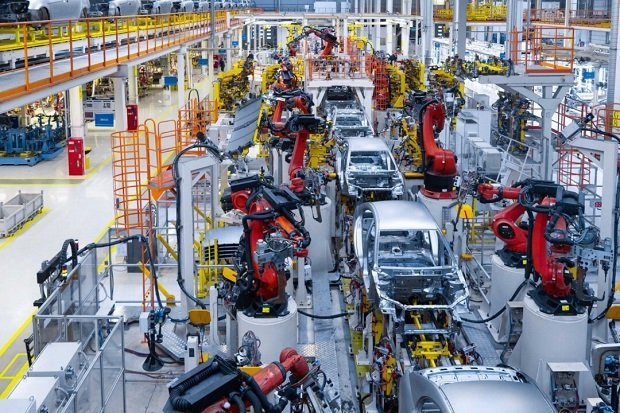Automotive Industry Trends & Growth: Future Outlook
Delve into the automotive market in India and Africa. Understand market size, industry trends, and growth prospects in these regions.

The automotive market is a dynamic and integral component of the global economy, encompassing the production, distribution, retail, and maintenance of motor vehicles. This market has undergone significant transformation over the years, driven by technological advancements, changing consumer preferences, and stringent regulatory frameworks. As we delve deeper into the intricacies of the automotive market, we will explore its current size, share, growth trends, key players, and the challenges it faces.
Market Size, Share, and Growth
The automotive market is a colossal entity, with a global market size valued at approximately $3.8 trillion in 2023. This market encompasses a wide range of vehicles, including passenger cars, commercial vehicles, and electric vehicles (EVs). The passenger car segment holds the largest share, accounting for nearly 60% of the total market.
Market Share Analysis
North America, Europe, and Asia-Pacific are the dominant regions in the automotive market. Asia-Pacific, led by China and India, is the largest market, contributing to over 40% of global sales. Europe follows closely, with Germany, France, and the UK being key contributors. North America, primarily the United States, also holds a significant share, driven by high consumer demand and robust infrastructure.
Growth Rate and Future Projections
The automotive market is poised for steady growth, with a projected compound annual growth rate (CAGR) of 3.5% from 2024 to 2030. This growth is largely driven by the increasing adoption of electric vehicles, advancements in autonomous driving technology, and rising disposable incomes in emerging economies.
Market Trends
Shift Towards Electric Vehicles
One of the most prominent trends in the automotive market is the shift towards electric vehicles (EVs). Governments worldwide are implementing stringent emissions regulations and offering incentives for EV adoption, driving significant growth in this segment. Major automakers are investing heavily in EV technology, with companies like Tesla, Volkswagen, and General Motors leading the charge.
Technological Advancements
The automotive industry is at the forefront of technological innovation. Autonomous driving, connected car technology, and advancements in battery technology are reshaping the market. Companies are focusing on enhancing vehicle safety, fuel efficiency, and user experience through these technological advancements.
Consumer Preferences
Modern consumers are increasingly prioritizing sustainability, convenience, and advanced features in their vehicles. This shift in consumer preferences is driving the demand for electric and hybrid vehicles, smart connectivity, and enhanced safety features. Automakers are responding to these demands by incorporating cutting-edge technology and eco-friendly solutions into their vehicle offerings.
Market Players
Leading Companies in the Industry
The automotive market is dominated by several key players who hold substantial market shares. Some of the leading companies include:
- Toyota Motor Corporation: A global leader with a market share of approximately 10.2%, known for its reliable and fuel-efficient vehicles.
- Volkswagen Group: Holding around 9.6% of the market, Volkswagen is a major player in both the traditional and electric vehicle segments.
- General Motors: With a market share of 8.3%, GM is a significant player in the North American market, focusing on innovation and sustainability.
- Tesla Inc.: Leading the electric vehicle market with a share of 3.9%, Tesla is renowned for its cutting-edge technology and ambitious growth plans.
- Ford Motor Company: Holding a market share of 7.2%, Ford is a prominent player in both the passenger and commercial vehicle segments.
Recent Mergers and Acquisitions
The automotive market has seen a flurry of mergers and acquisitions aimed at consolidating market positions and expanding technological capabilities. Notable transactions include:
- PSA Group and Fiat Chrysler Automobiles (FCA) Merger: Creating Stellantis, the fourth-largest automaker globally.
- Honda and General Motors Partnership: Collaborating on electric vehicle development and autonomous driving technology.
Market Challenges
Regulatory Hurdles
The automotive market faces stringent regulatory requirements related to emissions, safety standards, and fuel efficiency. Complying with these regulations requires significant investment in research and development, which can be a challenge for automakers.
Supply Chain Disruptions
The global automotive supply chain is complex and susceptible to disruptions. Events such as the COVID-19 pandemic, semiconductor shortages, and geopolitical tensions have highlighted the vulnerabilities in the supply chain, affecting production schedules and delivery timelines.
Competition and Market Saturation
The automotive market is highly competitive, with numerous players vying for market share. This intense competition, coupled with market saturation in developed regions, poses challenges for growth. Automakers need to continuously innovate and differentiate their offerings to stay ahead in the market.
Conclusion
The automotive market is a dynamic and rapidly evolving industry, characterized by significant technological advancements, changing consumer preferences, and regulatory challenges. As the market continues to grow, driven by the shift towards electric vehicles and autonomous driving technology, it presents numerous opportunities for both established players and new entrants. However, navigating the complexities of the market requires strategic planning, continuous innovation, and a keen understanding of consumer needs.
FAQs
- What is the current size of the automotive market?
The global automotive market is valued at approximately $3.8 trillion in 2023.
- Which are the leading companies in the automotive market?
Leading companies include Toyota Motor Corporation, Volkswagen Group, General Motors, Tesla Inc., and Ford Motor Company.
- What are the major trends in the automotive market?
Major trends include the shift towards electric vehicles, technological advancements in autonomous driving and connectivity, and changing consumer preferences towards sustainability and advanced features.
- What challenges does the automotive market face?
Challenges include regulatory hurdles, supply chain disruptions, and intense competition leading to market saturation.
- What is the future outlook for the automotive market?
The automotive market is expected to grow at a CAGR of 3.5% from 2024 to 2030, driven by the adoption of electric vehicles, technological innovations, and rising disposable incomes in emerging markets.
What's Your Reaction?










![Wireless Connectivity Software Market Size, Share | Statistics [2032]](https://handyclassified.com/uploads/images/202404/image_100x75_661f3be896033.jpg)



